Seeing Structure Project By Elez Beresin-Scher
A Photo Essay Sociological Memoir of My Life
Part One: Family and social networks
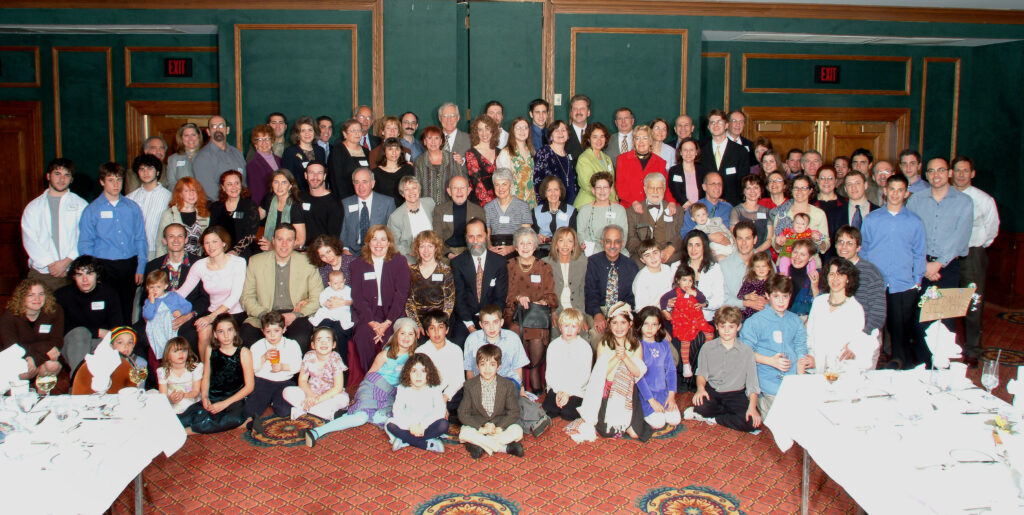
This is a photo from the Goldman family Seder in 2003, when I was 11 months old. My mother, standing in the middle of the right section, is holding me, dressed in red and pink, in a sling. Many of my cousins and aunts and uncles line the front two rows, but I don’t recognize more than half of my very, very extended family here. I was born into a large Ashkenazi Jewish American family that formed my very first social group and connected me to larger social networks as I grew up. Social groups foster social interaction according to the group’s norms, establishing normative behavior. They also connect members to resources through social networks, provide a sense of collective identity, and can increase our opportunities for success in life (Kaufman, Judith Halasz). My family and religious community have provided all of these things for me.
Many of the norms that my family and religious community have instilled in me come from Jewish values and political leanings. These include being kind to people, making the world a better place (tikkun olam, in Judaism), and democratic or leftist leaning values. But the norms my social groups have taught me also include more mundane behaviors, like table manners, fashion choices, and a love for the arts. These traits are widely shared by people in my extended family and religious community, meaning they have helped me form a sense of individual and collective identity. In other words, a life-long feeling of belonging.
My social networks have advantaged me in life because of the social statuses that people in my social groups belong to. My family is white, and many of my family members are middle and upper-middle class. This means they have experienced the benefits of cumulative advantages—benefits and resources that increase wealth and can be passed on through generations—meaning my family gives me access to generational wealth. Even though my family only came to America four or five generations ago, and came with no wealth, their race allowed them to accumulate wealth because they were advantaged by forms of institutional racism, such as racist federal housing policies (Kaufman). Now, through my family I have social capital: I have access to a large network of racially and economically privileged people in fields like law, academia, and medicine (Cucchiara). These connections have helped me with things like making important life choices, making a good impression in professional settings, receiving better health care, and getting into college. For example, my grandmother went to Bryn Mawr for graduate school, which most likely enhanced my application. In addition, through my synagogue I became friends with Eliane Nieder, a Bryn Mawr alum who gave me insight into the school when I was applying and let me do an overnight stay with her. Overall, my social group has shaped me into the person I am today and has connected me to the social networks that have helped me along the way.
Citations:
Kaufman, Judith Halasz, P. Social Structure and the Individual (A Sociology Experiment). Available from: Bookshelf Online – Ref, (2nd Edition). CritReview, 2023.
Cucchiara, Maia. Sociology of Education (A Sociology Experiment). Available from: Bookshelf Online – Ref, (2nd Edition). CritReview, 2023.
Part two: Parenting
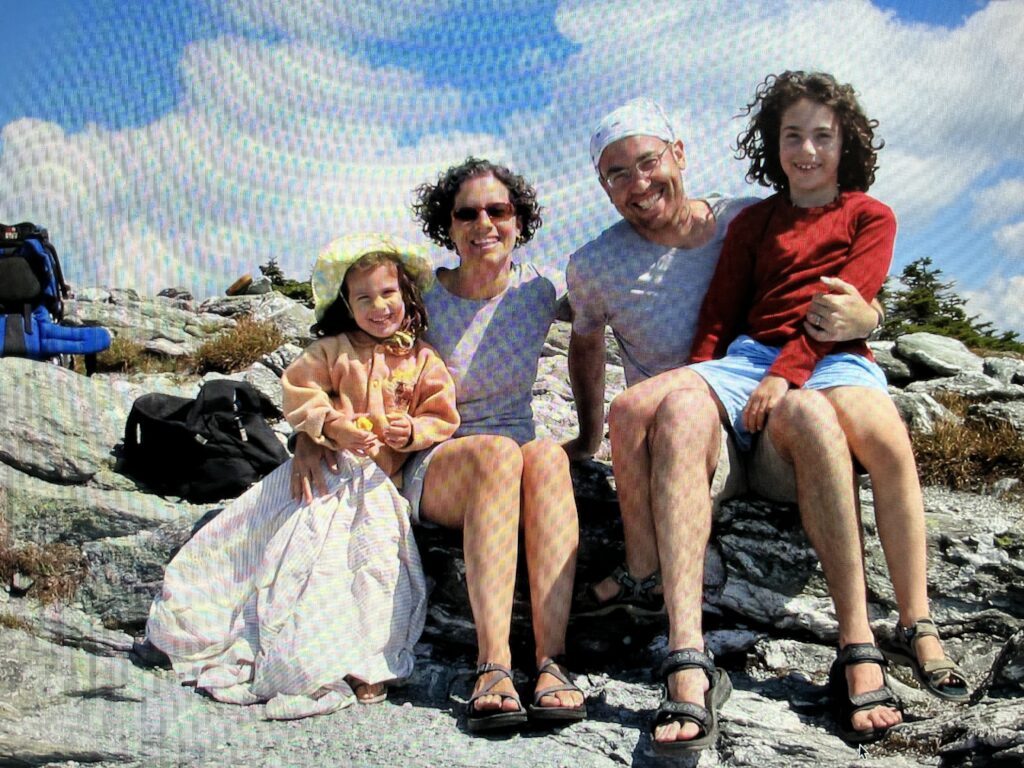
This picture is of my immediate family on one of our favorite mountains to climb in Vermont when I was around five and my sister was around ten. Being raised by wealthy, outdoorsy parents, we often vacationed in New England and went on fun outings that helped shape us physically and emotionally. In “Invisible Inequality: Social Class and Childrearing in Black Families and White Families,” Annette Lareau discusses how the childrearing style of middle- and upper-class parents, across black and white families alike, results in their children gaining an “emerging sense of entitlement.” Lareau calls this parenting style “concerted cultivation,” which involves nurturing children’s talents and abilities through organized activities and conversation, among other things. My mom and dad fit the mold of the parents that Lareau examined. They both attended school for many years, graduated from law school, and make an upper-middle class salary working for a non-profit and the Federal Communications Commission, respectively. Looking back, I see the advantages that their concerted cultivation parenting style afforded me.
My parents always encouraged my independence and ability to advocate for myself. They have fostered this skill in me over the years through language and discussion, often over the dinner table or on long car trips. In my sister and I, I recognize the ability to articulate our needs and defend our viewpoints eloquently, traits true to the children of lawyers. In addition to these skills, they have always encouraged us to speak up for ourselves to adults. This means when we complain about teachers, they suggest we meet with them one on one or send an email to an administrator so that our complaints are heard. Other times, this means that from a young age my dad stopped agreeing to make important phone calls on my behalf, such as to the bank or the doctor. Because of this, I now feel comfortable having one on one meetings with my professors, calling my bank on the phone to report debit card fraud, phoning my dentist to make an appointment or asking my doctor personal questions during yearly checkups.
These skills are reflective of my parent’s social class in multiple respects. Firstly, because of their class (and race) they have been treated well by professionals and thus have no reason to distrust them. Further, their working conditions and salaries afforded them the time and energy to teach me these skills. They have also imparted to me, through learned skills and through cultural outlook, the idea that I have the right to shape my surroundings to my advantage and receive help from the adults in my life. In other words, entitlement. This sense of entitlement has served me well, and I can see the ways that it will shape my future. Concerted cultivation has served as an advantage in my life not because it is an inherently better parenting style, but because the dominant cultural systems in America privilege the skills that my parents fostered in me (Lareau).
Citations:
Lareau, Annette. “Invisible Inequality: Social Class and Childrearing in Black Families and White Families.” American Sociological Review, vol. 67, no. 5, 2002, pp. 747–76. JSTOR, https://doi.org/10.2307/3088916. Accessed 3 May 2023.
Part Three: Gender
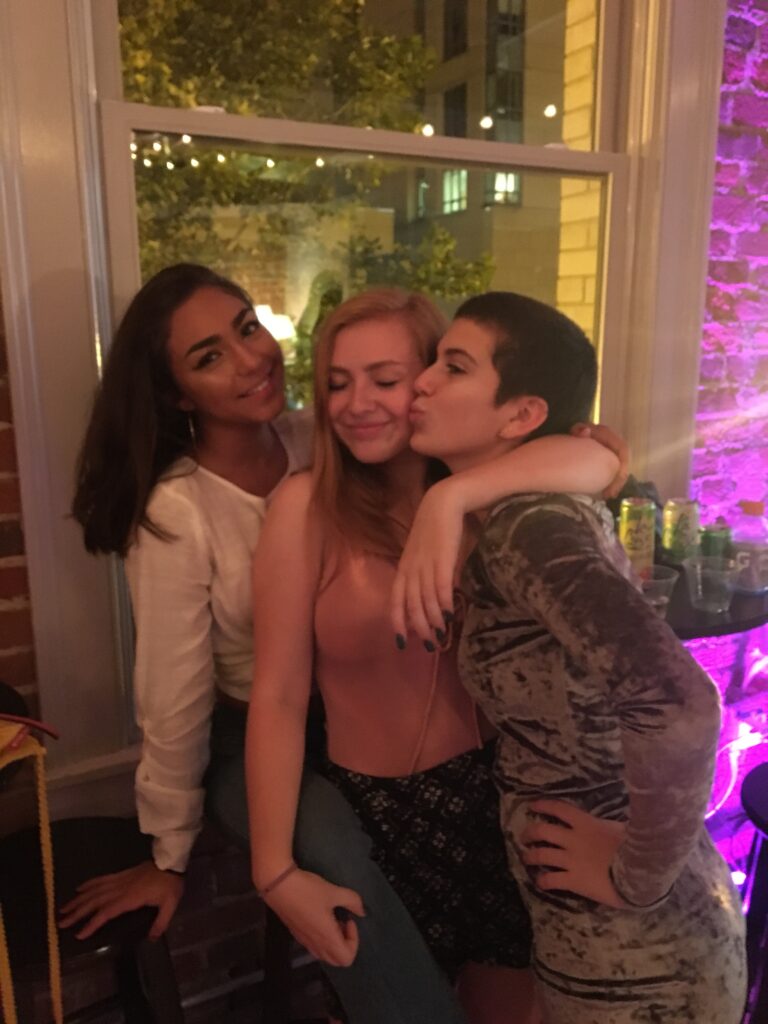
This is a photo of me and my friends Sofia and Stella in our sophomore year of high school at a friend’s birthday party. In a fairly accurate representation of my relationship with femininity throughout my life, I am wearing a tightly fitted green velvet dress and my hair is shaved, as I wore it through most of high school. I was assigned female at birth, and I still identify as a woman, meaning I am cisgender. Growing up in Washington, DC, I was socialized into womanhood through my interactions in society. In this sense, I do gender through my repeated actions and behaviors, actively (re)producing womanhood (Brown, Angela Barian, Todd Schoepflin). Growing up, I did gender when I dressed myself in feminine clothes (almost) every morning. I did gender when I asked for an American Girl Doll when I was around nine years old and when I got my ears pierced at ten.
However, I did not grow up in a completely “traditional” environment, and my parents allowed my sister and I significant freedom when it came to gender expression. In fact, my mother took certain steps to prevent certain kinds of gender socialization. She told me recently that when I was younger, she specifically refrained from bringing Barbie Dolls or fashion magazines into our house. Additionally, my parents prioritized my sister and I’s involvement in activities that fostered our creativity and joy, rather than our development into a certain kind of woman. Hilary Levey Friedman argues that parents pick out the kind of sport that they sign their daughters up for based on the kind of woman that they want their daughters to become. Parents sign their daughters up for dance if they want them to learn gracefulness and proper feminine appearance. If they want their daughters to be aggressive and assertive, parents sign them up for competitive sports. In a combination of the two, parents sign their daughters up for chess in order to reconcile a feminine appearance and mentality with aggressive skill and intellectual achievement (Friedman). My parents did not sign me up for any sports when I was young. Mostly, this was because they let me choose what I wanted to do, and I never chose sports. But they did sign me up for arts and crafts camps every summer, where I learned how to creatively express myself. They also asked me and my sister to choose an instrument we wanted to learn: my sister chose guitar, I chose piano.
As I grew older and developed self-awareness and personal tastes, my choices have reflected my gender socialization at home and in society. By choice, I joined my high school softball team, started amassing a large collection of dangly earrings, and continued to use she/her pronouns. However, I also shaved my head when I was fourteen, quit piano and got into punk and alternative music scenes, and never started shaving my legs or armpits. While my socialization into a heavily gendered society shaped me and continues to shape my identity and actions, my parents afforded me the freedom to find my own tastes regardless of gender and my social surroundings in the liberal bubble of DC where I grew up meant I could do so with few social consequences.
Citations:
Brown, Angela Barian, Todd Schoepflin, J. Gender and Sexuality (A Sociology Experiment). Available from: Bookshelf Online – Ref, (2nd Edition). CritReview, 2023.
Friedman, Hilary Levey. 2013. “Soccer Isn’t for Girly-Girls? How Parents Pick
the Sports Their Daughters Play.” The Atlantic: Sexes. https://
www.theatlantic.com/sexes/archive/2013/08/soccer-isnt-for-girly-girls-how-par-
ents-pick-the-sports-their-daughters-play/278386/.
Part Four: Class and Education
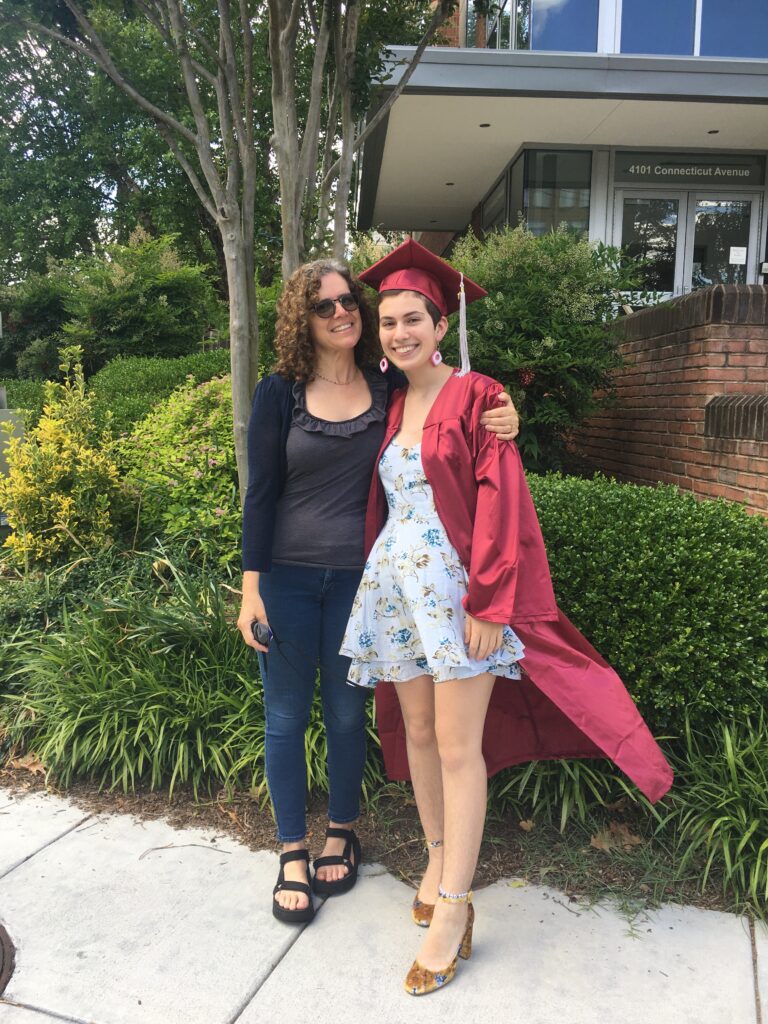
This is a photo of me and my mom standing outside my high school, Edmund Burke, after I graduated in 2020. There are no photos from my graduation, because I graduated during the Covid-19 pandemic, so the ceremony was online. Like other aspects of my life, social class has shaped my educational career. I attended public schools up until high school, when I chose to apply to Burke, a private school. My parents let me choose where I wanted to go and toured private and public high schools with me. I think part of the reason I chose Burke was because I was unhappy with my middle school experience, where preparation for standardized testing was emphasized over other educational material, due to policies like the No Child Left Behind Act (Cucchiara). As a school that received private funding, Burke could provide an education I was more interested in, and because I had the resources to afford it, I could make that choice.
I also recognize the social reproduction that occurred in my educational experinces. The social class I was born into helped me perform well in school and get ahead, which will in turn help my prospects in the future, allowing me to remain in the same social class. There are small factors in this process, such as the fact that I have never experienced food insecurity and my parents had the time and experience to help me with homework. There are also seemingly larger factors, like my cultural capital (I was excellent in AP Art History, I had prior knowledge of the arts) and economic capital (I took a few tutoring lessons in math to prepare for my SATs). In this sense, I was advantaged by the opportunity gap because I had greater access to resources and opportunities (Cucchiara).
Further, as a private school where many of the students had professionals for parents, Burke’s hidden curriculum socialized me to prepare to follow in their footsteps (Cucchiara). The hidden curriculum refers to the unofficial lessons in socialization that schools teach, that often reproduce inequality. At Burke, we called our teachers by their first names, visited their offices to chat during lunch, and developed meaningful relationships with them over the years. In doing so, we learned that we deserved the same respect that adults did, and that our thoughts and leadership skills were valuable. Additionally, students were allowed to leave campus during the day without signing in or out, we had free periods where we could do what we pleased, and there was no cafeteria so we could each lunch wherever we wanted with little supervision. These rules taught us to be responsible for ourselves and to feel entitled to a certain freedom of movement. All together, how the administration treated students at Burke socialized and prepared us for the same kind of life our parents led.
Citation:
Cucchiara, Maia. Sociology of Education (A Sociology Experiment). Available from: Bookshelf Online – Ref, (2nd Edition). CritReview, 2023.
Part Five: Sexuality and deviance
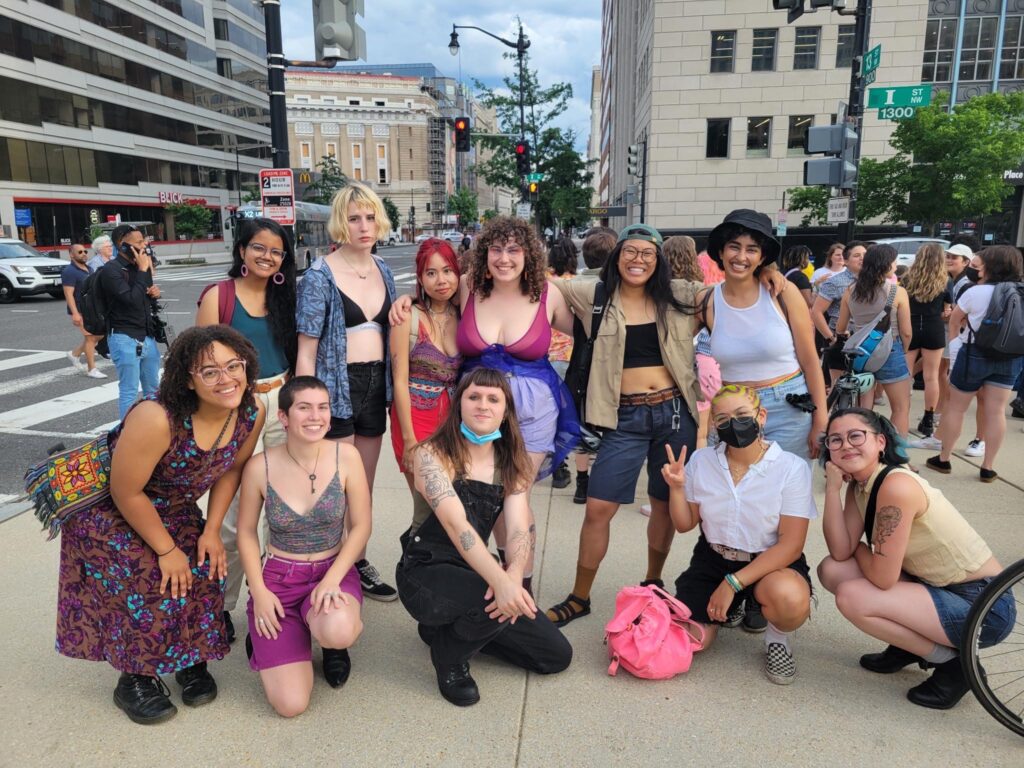
This is a photo from the DC dyke march last summer (2022). I attended it with my sister (standing center), her friends, and my friend Helene. I am kneeling on the bottom left with Helene to the left and my sister’s girlfriend, Jodie, to the right. I came out as lesbian in 9th grade, after my sister had come out as bisexual about four years earlier. Compared to a lot of friends I met in high school and college, I realized this was fairly early timing for both of us.
Deviance is socially agreed upon, meaning that whether or not a certain behavior is considered deviant depends on social context such as time and place. In certain places in America, being gay has been and still is considered deviant. Even in DC, at a certain time, queerness was considered deviant, hence the ongoing practice of the dyke march. However, in contemporary DC and surrounding areas, norms have changed and being gay is generally not considered deviant. This has to do with changing mores surrounding sexuality, meaning collective opinion on homosexuality has shifted, as well as laws, such as the legalization of same-sex marriage (Sykes). Since I grew up in DC, my perception of deviance was shaped by my liberal social surroundings, and my sister and I’s queerness thus did not create much internal conflict for me. In addition to my greater social surroundings, my family had a lot to do with why I had a relatively easy time discovering my sexuality and coming out. I learned from my parents that queerness was acceptable from the way they phrased conversations about my potential future partners (“maybe your future husband—or wife…”). From my sister, whom I revered, I learned that queerness was more than just acceptable, it was even good—she told me about her first girlfriend when I was around twelve, before she told our parents.
This doesn’t mean that my relationship with my lesbianism has always been completely happy and easy. Despite DC’s liberalness, I still existed and do exist in a heteronormative society that exerts social control over sexuality (Brown). Heterosexuality has been enforced around me as normative behavior through representations of happy couples in children’s books and teen media, the extent of sex education that I received in high school, and homophobic comments from middle school teachers and high schol boys. I spent extensive amounts of time in high school questioning myself with little to no queer friends my own age or adults to look to. It wasn’t until college, when I made many queer friends and had my first real queer experiences that I stopped doubting myself, although I do think understanding one’s own sexuality is an ongoing process.
Citations:
Sykes, Angela Barian, Patrick Sharkey, B. Deviance, Crime, and Violence (A Sociology Experiment). Available from: Bookshelf Online – Ref, (2nd Edition). CritReview, 2023.
Brown, Angela Barian, Todd Schoepflin, J. Gender and Sexuality (A Sociology Experiment). Available from: Bookshelf Online – Ref, (2nd Edition). CritReview, 2023.
The End!